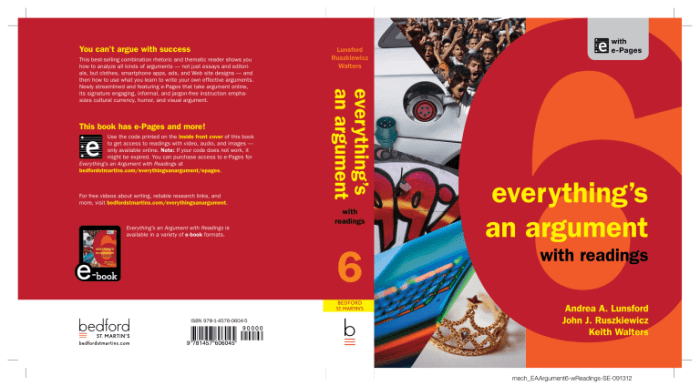Everything’s an argument with readings 9th edition online – Everything’s an Argument with Readings, 9th Edition Online, is an authoritative and comprehensive resource that delves into the multifaceted world of argumentation. This essential guide provides a thorough examination of the principles, techniques, and applications of effective argumentation, empowering readers to engage in critical thinking, persuasive writing, and informed decision-making.
From the fundamental concepts of argumentation to its practical applications in various contexts, this online edition offers a structured and engaging learning experience. With its user-friendly interface and interactive features, Everything’s an Argument with Readings, 9th Edition Online, is the definitive guide for students, scholars, and professionals seeking to enhance their argumentation skills.
Definition of Argument
An argument is a logical presentation of claims and evidence intended to persuade or convince an audience of a particular point of view. It consists of a claim, evidence to support the claim, and reasoning that connects the evidence to the claim.
Types of Arguments, Everything’s an argument with readings 9th edition online
- Deductive arguments: Make a general claim based on specific evidence, where the conclusion follows logically from the premises.
- Inductive arguments: Make a general claim based on specific evidence, but the conclusion does not necessarily follow logically from the premises.
- Analogical arguments: Draw a comparison between two similar things and argue that what is true of one is also true of the other.
- Causal arguments: Argue that one event (the cause) leads to another event (the effect).
Elements of an Argument
Key elements of an argument include:
Claim
The main point or thesis of the argument.
Evidence
Facts, statistics, examples, or other information used to support the claim.
Reasoning
The logical connection between the evidence and the claim.
Identifying Arguments in Everyday Life

Arguments can be found in various contexts, including:
Conversations
People often engage in arguments to persuade each other or defend their beliefs.
News Articles
News articles often present arguments to support their claims about current events.
Advertisements
Advertisements use arguments to persuade consumers to purchase products or services.
Evaluating Arguments: Everything’s An Argument With Readings 9th Edition Online
Criteria for evaluating arguments include:
Validity
Whether the argument is logically sound and the conclusion follows from the premises.
Soundness
Whether the argument is valid and the premises are true.
Strength
The overall persuasiveness of the argument, considering the quality of the evidence and reasoning.
Constructing Effective Arguments
Strategies for constructing effective arguments include:
Using Relevant Evidence
Provide evidence that is directly related to the claim and supports the argument.
Using Logical Reasoning
Clearly explain the connection between the evidence and the claim.
Avoiding Fallacies
Identify and avoid common logical fallacies that weaken arguments.
Answers to Common Questions
What are the key elements of an argument?
The key elements of an argument include the claim, evidence, reasoning, and conclusion.
How can I identify arguments in everyday life?
Arguments can be identified in everyday life by analyzing the structure and purpose of communication, paying attention to claims, evidence, and reasoning.
What are the criteria for evaluating the validity and soundness of arguments?
Arguments can be evaluated based on their validity (logical structure) and soundness (strength of evidence and reasoning).
How can I construct effective arguments?
To construct effective arguments, focus on developing a clear claim, providing relevant evidence, using logical reasoning, and anticipating potential objections.
What is the role of argumentation in different contexts?
Argumentation plays a crucial role in various contexts, including law, politics, academia, and media, influencing decision-making, shaping public opinion, and advancing knowledge.